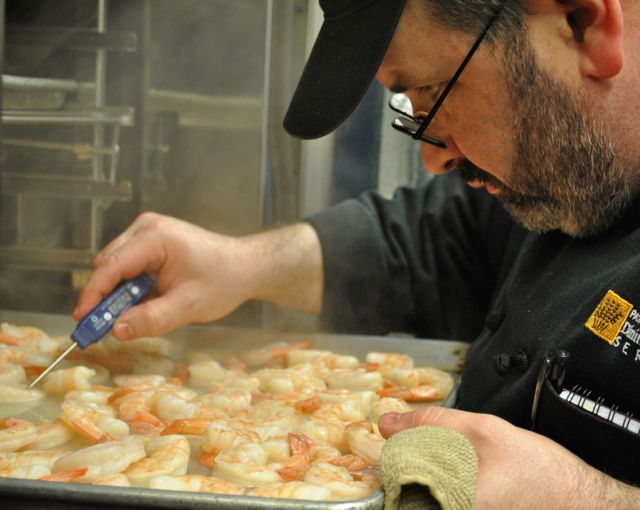Page 77 • (980 results in 0.1 seconds)
-

Tacoma Rescue Mission Executive Director and PLU alumnus Duke Paulson on adapting through the pandemic Posted by: Marcom Web Team / July 13, 2020 July 13, 2020 By Lora ShinnMarketing & Communications Guest WriterDuke Paulson ‘93 graduated from PLU in 1993 with a major in biology and a minor in psychology. While at PLU, he was on the swim and rowing teams, played soccer for a bit, and was heavily involved in Young Life. Today, he's executive director of Tacoma Rescue Mission where COVID-19 has
-

, participating in campus clubs, and volunteering at the PLU Food Pantry. “I am really grateful for all that Act Six has provided,” Mosa said. “It helped me connect to professional leaders … and helped to train me and provide me with strategies to help me succeed in my college career and in my future career.” Read Previous PLU professors and students dive deep into the psychology of the pandemic Read Next On the road to D.C., Lummi Nation carvers bring fight to save indigenous lands to PLU COMMENTS*Note: All
-

, psychology major & internship with the Dean of Students Office COMMENTS*Note: All comments are moderated If the comments don't appear for you, you might have ad blocker enabled or are currently browsing in a "private" window. LATEST POSTS Caitlyn Babcock ’25 wins first place in 2024 Angela Meade Vocal Competition November 7, 2024 PLU professors Ann Auman and Bridget Haden share teaching and learning experiences in China November 4, 2024 Lutes celebrate another impactful Bjug Day of Giving: a PLU
-

inaugural dean of PLU’s College of Health Professions. The college includes PLU’s School of Nursing, Department of Social Work, Department of Marriage and Family Therapy, and Department of Kinesiology. Take us back to your college years, what attracted you to the field of marriage and family therapy? I just felt a passion for helping people in this particular context because of the strong relationships that I had, which is why I chose marriage and family therapy as opposed to psychology, because of its
-

, and psychology. Exploring the when, what, and why of labile metabolite production and excretion by marine microorganisms “These organisms are tiny, but they are diverse and abundant, and their cellular activities all add up together to control how much carbon makes it into the deep ocean, where it is stored for thousands of years or even longer,” said Professor Boysen. “We use analytical organic chemistry tools, such as gas-chromatography mass spectrometry, to measure the molecules that microbes
-
) HIST 121: History in Video Games (4) HIST 247: U.S. Capitalism: From Railroads to Netflix (4) HIST 346: History of Innovation and Technology (4) PHIL 225: Business Ethics (4) POLS 345: Government and Public Policy (4) PSYC 351: Minds, Brains, and Computer: Introduction to Cognitive Science (4) PSYC 448: Cognitive Psychology (4) Innovation Seminar 4 semester hours INOV 350: Innovation Seminar (4) Innovation Studies (INOV) - Undergraduate Courses INOV 350 : Innovation Seminar Hands-on seminar for
-
(PLUS) Policies and Standards (Graduate) Political Science Pre-Professional Studies: Health Sciences Pre-Professional Studies: Law Pre-Professional Studies: Military Science Pre-Professional Studies: Peace Corps Prep Certificate Pre-Professional Studies: Theological Studies Principles of General Education Producing and Presenting Culminating Scholarship Progress Alerts Psychology Publishing and Printing Arts Refunds: Course Fees Refunds: Fall/Spring Tuition Refunds: Insurance Fee Refunds: Summer/J
-
Kelly Valentin Grant Project Coordinator Full Profile 253-535-7265 valentkc@plu.edu
-

, quin-what?’ Katye Griswold’s ’13 perspective on food drastically changed after reading a diet book written by Rory Freedman and Kim Barnouin during her sophomore year. More On the opposite end of the college food spectrum, is psychology major Katye Griswold ’13, who has also lived off campus for more than a year. She’s arguably one of the more ambitious aspiring chefs among her peers. “I have a go to meal for like a month and then I change it,” Griswold said. “Sometimes it’s pasta with whatever I
-
Christiansen, Amberly LunsfordPsychologyLengthening Lexicon: The Connection Between Household Size and Acquisition of Extended Familial Terms Faculty Mentor: Sara Finley, Psychology This study used the Wordbank database, which includes data from over 92,000 children in 42 languages. It examined whether children living in countries with higher average household densities would learn extended familial terms quicker than those living in countries with lower average household densities. Jackson HeltEarth
Do you have any feedback for us? If so, feel free to use our Feedback Form.


